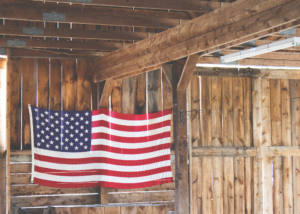 There are lots of disagreements in this election even among people in the faith. We can agree that Jesus is the only way to Heaven but we can’t agree on who should be our next president. Not only is there lots of disagreement, but there is massive amounts of mud-slinging, not just from the candidates, but even from those of us in the church onto both candidates.
There are lots of disagreements in this election even among people in the faith. We can agree that Jesus is the only way to Heaven but we can’t agree on who should be our next president. Not only is there lots of disagreement, but there is massive amounts of mud-slinging, not just from the candidates, but even from those of us in the church onto both candidates.
So recently I ran across this article by Zach Boehm, that I thought was an excellent unifying conversation. It’s titled “6 Political Points We Can All Agree On”. You can read the article HERE or I’ve pasted it below. None of the six things are political in nature, but I believe they are all positive in nature. I think we should all take these things to heart and consider committing to all six of them for the remainder of this political season:
As a political junky, I (Zach) have always loved election seasons. In college I threw parties to watch debates and election night results. (Yep I’m that kind of nerd.)
But in the new age of social media, political seasons are exhausting. Opinions surround us, and they’re seldom shared with grace or humility.
How should I as a Christian influence the discussion? What is my obligation to the process, both as an American in a democracy and as someone called to be the salt and light of the world?
I came up with a list of 6 commitments I’m trying to hold throughout the process, a code of conduct, if you will. I haven’t aced it, but I’m trying.
What do you think of the list? Is there anything that should be added or removed?
1. I won’t buy into fear.
Political ads are mostly built with the basic formula, “You should be terrified at what our country will look like if our candidate is not elected.” Everyone is trying to make us afraid.
The Presidency is an incredibly important position, but the President doesn’t have nearly the power the politicians (and our friends) want us to believe. No matter who is elected, God is in control. If I walk around in fear of a particular candidate winning, I have forgotten where my strength and hope are truly found.
2. I won’t sell fear.
“Do not be afraid” is one of the most common commands in the Bible. God has a big problem with us living in a state of fear.
I bet He’s also not a fan of me using fear to persuade others. I can’t in one breath tell my friend God is in control, and in the next convince them the world will end if America doesn’t elect my candidate.
3. I won’t make personal attacks.
I’m not proud of the way I’ve levied personal attacks on candidates I’ve disliked. He or she is a person created in the image of God; a person who God deemed valuable enough to die for. Speaking of them with contempt is undefendable.
The Bible doesn’t contain an escape clause that allows us to violate all it says about loving people during an election cycle. If I can’t express my disagreements on ideas without making slanderous attacks, I should keep my mouth shut.
4. I won’t put my politics before my faith.
Am I a Christian first and an American second, or an American first and a Christian second? Am I able to exhibit love, joy, peace, patience, kindness, goodness, faithfulness, gentleness and self-control while talking politics? What does it say about my true priorities if those fruits disappear in my efforts to win political arguments?
If I start being more concerned with how someone sees my candidate or party than with how they see my loving God, I’ve lost my way.
5. I won’t spend more time talking than praying.
My pastor once challenged us with this simple question: Which do you believe accomplishes more for our country, debating politics or praying? Asked inside a church, the answer was obviously prayer. But then he asked: Which do you spend more time doing?
I admit, debating is more fun for me than praying. If I actually want to see change, though, and truly believe what I claim, I need to pray much more.
6. I will vote.
Romans 13:1 says, “Everyone must submit to governing authorities. For all authority comes from God, and those in positions of authority have been placed there by God. (NLT)”
The governing authority in the U.S. is the U.S. Constitution. Who does the Constitution say has the power? We the People. In a representative democracy, we all are in positions of authority to some degree. To not vote is to abdicate our responsibility.
Even if I’m not crazy about the two major party candidates, there are a dozen of other issues I have the opportunity and responsibility to speak into on the ballot.
Our government caters to the people who actually show up to vote. My vote might not be the single vote that decides any issues, but if I want the government to share in my concerns, I have to do my part by showing up.
Want some more thoughts about the importance of voting? Or info on how to get registered? Here’s a great place to get started.